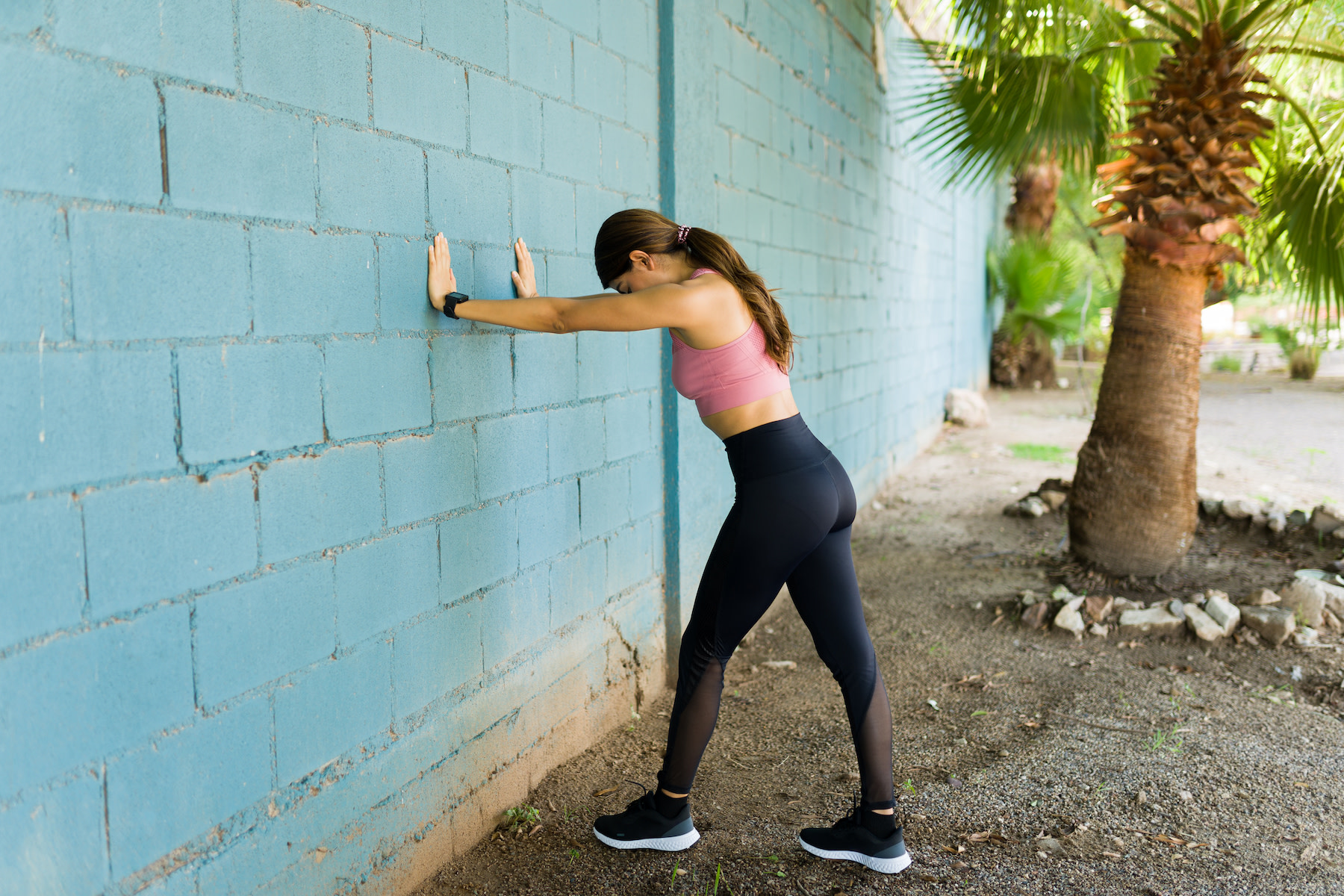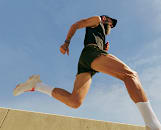
8 Golf Stretches to Improve Flexibility (and Your Golf Swing)
Feeling as stiff as your clubs? Try these simple mobility and flexibility moves before and after your round to increase your range of motion—and the length of your drives.
By Karla Walsh•
How Stretching Can Make You a Better Golfer
4 Best Stretches to Do Before Golf
5 Best Stretches to Do After Golf
Takeaway
On a quest to become a better golfer, you might invest time and money in a new set of clubs, hitting balls at the range, practicing pitches and putts at the green, and perhaps hiring a coach for lessons.
Discover more ways to reach your goals with Peloton
These are all worthy and laudable tactics to try to get closer to par or birdie territory, however for many golfers, “the real issue is that your body just won’t let you move a certain way. The new club technology is designed to eliminate your slice or hook, but if you had the flexibility and strength to perform the proper golf movement, you could solve it without spending a fortune,” says Keith Sobkowiak, a doctor of physical therapy and the regional director of the Northeast at FYZICAL Therapy and Balance Centers in Wallingford, Connecticut (who is also Titleist Performance Institute-certified).
Ahead, Peloton instructor Selena Samuela, who is also a Titleist Performance Institute Certified Coach, shares her best tips for golf stretching and mobility. Plus we’re diving into why golf stretches are far from a waste of time—and share the best golf stretches to try pre- and post-round to reduce your risk for injury and increase the chances of scoring a personal best.
How Stretching Can Make You a Better Golfer
Stretching can help you improve at golf because range of motion and flexibility is key for optimal golf performance. “If you can do more with your body you can do more with your swing,” explains Selena. “The better your range of motion and body awareness is, the easier it is to complete the quality and consistent proper kinematic sequence that’s required for a strong swing.”
According to Sobkowiak, the three most common causes for distance loss, inconsistent swings and shots, and golf-related injuries relate to:
Hip stiffness, which leads to rotation and weight-shifting issues
Mid-back tightness and stiffness, which can restrict rotation during the backswing and follow-through
Core weakness, which makes it difficult to move your upper and lower body separately and limits the ability to generate as much power as possible
If you have better mobility, you’re also less likely to overcompensate and move in ways that might lead to immediate or overuse injuries. Dan Kelley, MD, a primary care sports medicine physician at Endeavor Health in Chicago (and a weekly amateur golfer) says that the majority of golf injuries can affect the spine, wrists, elbows, shoulders, and knees. A proper warm-up and cooldown to “sandwich” each round and practice session can help prime your joints and muscles—and lower the chances of getting hurt.
Before jumping into the best golf stretches to add to your routine, Selena points out that it’s important to reframe what we’re doing.
“A lot of folks think of static stretching when they see the word ‘stretching,’ and that really does not do justice to what we are talking about, related to accessing more range of motion to improve our golf swing mechanics,” Selena says. For this reason, “I like to use the term ‘mobility’ instead of ‘stretching.’”
As a refresher, static stretching is all about flexibility. It involves holding one position without movement, such as a hamstring stretch during which you attempt to touch your toes. Mobility asks for flexibility and more: range of motion, strength, coordination and balance. When we’re mobile, we’re able to move naturally, freely, and easily. A bird dog exercise is a terrific example.
4 Best Stretches to Do Before Golf
When it comes to golf stretches that boost that all-important mobility, you’ll notice that most of the options we recommend integrating before you play are dynamic stretches. As Selena explains in her 10-Minute Pre-Round Warm-Up for Golfers, dynamic stretches (aka active ones that involve movement rather than a steady hold) put your body through a range of motion similar to the course. This will loosen you up, plus, dynamic stretches have been scientifically proven to increase driving distance and accuracy better than static stretching.
Start with five minutes of walking, then loosen up with a few arm circles and standing truck rotations, Dr. Kelley recommends. Then you’re all set to proceed to these pre-round golf stretches:
Wrist Figure 8s
Muscles and joints worked: Shoulders, wrists, forearms
Stand with feet shoulder width apart and knees loose.
Interlock your fingers to clasp your hands, then lift your arms to raise your hands to about shoulder height.
Flipping your left hand over right, then right hand over left, trace a sideways “8” in the air.
Complete 20 figure 8s.
Rotational Lat Stretch
Muscles worked: Shoulders, back
Standing in front of a vertical bar or a sturdy pole, place feet shoulder width apart.
Using your right hand, grasp the bar or pole.
Step one foot about 8 to 12 inches back. Hinge at your hips, and with knees loose, lower into a half squat.
With the right hand secure, twist your left hand and arm in front of your chest and under your right armpit.
Twist back to starting position, completing 10 reps total.
Switch hands, and do 10 more reps.
Windmill Turns
Muscles worked: Back, abs
Stand with feet shoulder width apart and knees loose, with a golf club placed horizontally behind your neck and across both shoulders.
Grab both ends of the golf club with each hand (your arms form the letter “W”).
Keeping your core engaged and shoulders open, turn your shoulders to twist your chest to the left, then to the right.
Complete 20 twists to both sides.
4-Way Leg Swings
Muscles worked: Back, hips, hamstrings
Stand at a comfortable distance from, but within arm’s reach of, a vertical bar on a golf cart or a sturdy pole. Position feet shoulder width apart and keep knees loose.
Hold onto the bar or pole with both arms. Keeping your core engaged, swing your right leg away from your body (externally to the right), then swing it back to center and across to the left. Try not to allow the core to sway throughout this movement.
Complete 10 swings on the right leg, then switch legs and repeat 10 more swings on the left leg.
After completing these pre-golf stretches, but before hitting balls at the range or on the tee, Dr. Kelley suggests taking 10 regular practice swings and 10 reverse practice swings (for example, left-handed for right-handed golfers) to help loosen up the arms, spine, and hips, and balance out the back muscles a bit more before placing your ball on a tee.
5 Best Stretches to Do After Golf
If you’ve played a match, “you’ve walked 18 holes which means you probably walked five to six miles. Your calves, hamstrings, and lower back are most likely what you’d like to target” with your post-golf stretches, Selena says.
After you play is an A-OK time to sprinkle in a few more static stretches, our experts agree.
Repeated Lumbar Extension
Muscles worked: Back, abs
Stand with feet shoulder width apart and knees loose.
Place both hands on opposite sides of your lower back.
Keeping your core engaged and using your hands and fingers as a pivot point, bend backwards at the waist as far as you comfortably can.
Hold this position for 5 seconds, then return to upright.
Complete 10 slow and steady reps.
Prayer Stretch
Muscles worked: Back, chest, shoulders
Stand with feet shoulder width apart and knees loose in front of a sturdy object at about hip height, such as the back of a bench.
Place both hands on the bench.
Alternate stepping your feet back, hinging at the hips to allow your head to be about parallel to the top of the bench (or at whatever angle feels like it opens up your shoulders).
Hold this position for 30 seconds, then return to upright.
Cross-Legged Forward Fold
Muscles worked: Hamstrings, hips, glutes, lower back
Stand with feet shoulder width apart and knees loose.
Cross your right leg over your left, so that your right heel is about in line with your left toes.
Keeping core engaged, hinge at the hips to reach down toward your toes. (Selena suggests thinking about unlocking each vertebra one at a time on the down, as well as on the way back up).
4. Hold this forward fold for 30 seconds, then slowly come back to standing. Repeat on the other side.

Antonio_Diaz/iStock / Getty Images Plus via Getty Images
Calf Stretch
Muscles and joints worked: Calves, ankles
Stand with feet shoulder width apart and knees loose, about 6 inches away from a sturdy object such as a wall or tree.
Keeping your right foot planted, lift your left foot toward the wall. Place your left heel on the ground with the ball of the left foot and your toes on the wall.
Slowly lean in towards the wall to deepen the stretch. (It should feel pleasant rather than painful.)
Hold this forward fold for 30 seconds, then switch legs and repeat.

Cat-Cow
You can do a traditional Cat-Cow on all fours, or Selena says if you are at the club you can do a standing Cat-Cow using your golf club for support.
Start in a standing position and use your golf club for stability (place the club head down on the ground a few feet in front of you and hold on to your grip.)
Lean forward in about a 45 degree angle and focus on lumbar spine cat cows (lower back Cat-Cows)
“The best way to know you’re doing this right is think about tucking your tailbone under by squeezing your glutes and then think about pointing your tailbone up to reverse the movement,” says Selena.
Takeaway
Golf stretches can help improve mobility, which plays a major role in reducing the risk for golf injuries and improving range of motion so you can play stronger and longer. It’s wise to incorporate golf stretches before and after every time you use your clubs; be it for a full 18-hole round or for a session at the driving range.
If you’d like to up the ante, try this 20-Minute Full Body Mobility for Golfers two or three times per week. The mobility class is part of Selena’s program, Strength for Golfers that will challenge your strength and mobility for a better golf game.

Peloton App
Access thousands of classes with no equipment needed.
This content is for informational and educational purposes only and does not constitute individualized advice. It is not intended to replace professional medical evaluation, diagnosis, or treatment. Seek the advice of your physician for questions you may have regarding your health or a medical condition. If you are having a medical emergency, call your physician or 911 immediately.
Level up your inbox.
Subscribe for a weekly dose of fitness, plus the latest promos, launches, and events.
By providing your email address, you agree to receive marketing communications from Peloton.
For more about how we use your information, see our Privacy Policy.











